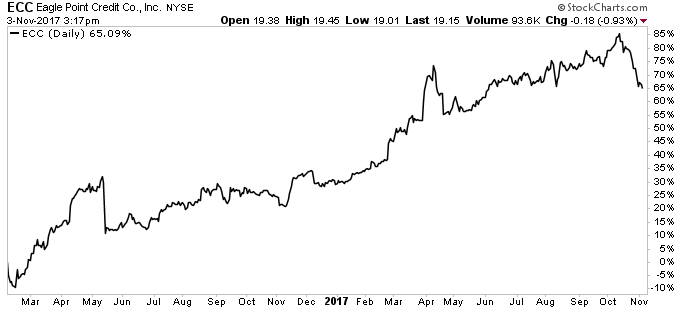Eagle Point Credit Company Inc: Is This 14.8% Yield Safe?

Can You Trust This 14.8% Yield?
About 25% of Wall Street analysts take medication for mental illness.
That keeps me up at night. It means the other 75% go walking around untreated.
For that reason, I always approach the latest round of financial innovations with the certain degree of skepticism. I tend to stick to simple, boring investments that have stood the test of time. The “get-rich-quick” mentality in Manhattan can make a muck of good business sense.
With that rant out of the way, today’s post looks into Wall Street’s latest brainchild, Eagle Point Credit Company Inc (NYSE:ECC). The firm buys up in collateralized loan obligations (CLOs) and pays out the profits to shareholders. And with an upfront yield of 14.8%, the business cranks out one of the highest payouts around.
Which leaves a couple of questions. First, what the heck is a CLO? And second, should investors buy into this latest invention of financial industry mumbo-jumbo? Here’s the scoop.
A CLO is a pool of loans, usually money lent out to highly leveraged companies. And like traditional bonds, investors receive scheduled interest payments.
Banks carve up these pools into slices with different risk profiles. Investors in the most senior, AAA-rated slice get paid first and enjoy the most insulation from any defaults. They also earn the lowest yields. Slices of debt further down the pecking order earn higher returns, but will suffer losses if defaults rise. The equity tranche stands last in line to get paid. They earn the highest yield overall in exchange for taking any losses first.
Such an alphabet soup of acronyms brings back memories of the financial crisis. But CLOs, in fact, soldiered through the Great Recession quite well. Aside from small paper losses, the highest-rated securities suffered little to nothing in the way of defaults.
In fact, between 1994 and 2013, the most senior CLO tranches have incurred no losses whatsoever. Loss rates for middle-rated tranches, meanwhile, came in at just 1.1% over that period.
Moreover, regulators have clamped down on CLOs with more stringent rules and guidelines. That includes forcing bankers that create a new offerings to retain at least five percent of the securities. This, in theory anyway, keeps Wall Street from packing up garbage loans and pawning them off to unsuspecting investors.
Eagle Point has built a lucrative business around buying up these securities. Through the first six months of 2017, the company received $30.1 million in interest income, plus an additional $2.2 million from realized gains on investments. That $32.3-million total was offset by $15.4 million in expenses for net investment income of $16.9 million.
Most of this money gets passed on to shareholders. Eagle Point pays out a monthly dividend $0.20 per share, which comes out to an ordinary yield of 12.4%. And unlike most stocks with oversized yields, the company’s cash flows can easily cover this distribution.
It gets better. Management pays out any leftover profits to investors in the form of a special dividend each year. If we include this extra distribution, that brings the total yield up to an impressive 14.8%.

Source: StockCharts.com
The catch?
Leave it to Wall Street to mess up a simple business. CLO managers often juice returns by buying up the junkiest securities. This backfired in 2014, when prices got beaten down by a wave of defaults in the oil patch.
Other firms buy up AAA-rated CLO tranches with copious amounts of leverage. Hedge funds often buy up senior tranches and borrow money against them to increase the size of their positions between five and 10 times. That can boost yields–and losses–significantly.
In the case of Eagle Point, executives have avoided some of these pitfalls. The team has kept the balance sheet reasonably clean, with only a light debt load. Most of the outstanding liabilities come in the form of preferred stock, which offer more flexibility in the event of a downturn.
The only possible downside? Eagle Point invests most of its capital into the “equity tranches” of these debt pools. As mentioned above, these slices offer the highest payouts, but also come with the highest risk. In the event some of these deals sour, shareholders will suffer steep losses.
The Bottom Line on ECC Stock
Eagle Point’s 14.8% yield is safe–for now. As long as the economy keeps humming, interest payments should roll in. Units, for those that can stomach a little extra risk, represent an income supplement for yield-hungry shareholders.











